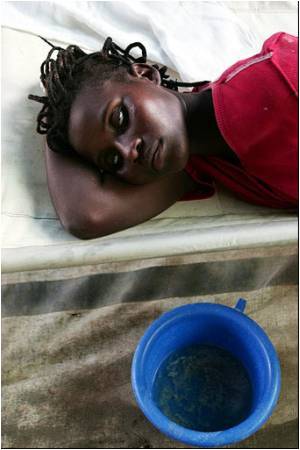
On the banks of the Congo river in Kinshasa, old habits are proving hard to break despite an outbreak of cholera that has already claimed 279 lives.
Keto, a man in his 30s dressed sharply in jeans and white tee-shirt, was not bothered -- though he had no idea how the disease was caught.
In any case, said Keto, he was not worried: he had drunk the river water and still felt fine. And in any case, he added, he had never heard of water making you sick.
Keto lives on one of the islets along the river Congo, a stone's throw away from Kinshasa's port of Ngamanzo.
Like a lot of other local people who don't have running water in their homes, he uses the river not just for drinking water but for cooking and the laundry.
Advertisement
The country's latest cholera outbreak began in the northeastern province of Province Orientale in March, spreading west to Bandundu before reaching Equateur and Kinshasa.
Advertisement
According to the latest official toll, the outbreak has already killed 279 people out of the 4,062 cases detected across the country.
The Ngamanzo dispensary recorded its first case in mid-June and has since recorded 15 cases in all, including a 35-year-old woman who succumbed to the disease.
Officials there say it is the first time that cholera has struck the area. Known as the "dirty hands disease", cholera's symptoms include diarrhea, a high fever and sometimes vomiting.
But when the first cases appeared, some local people would not accept the river water was to blame, said Gilbert Kanyinda, one of the local officials trying to educate people to the dangers of the disease.
"They say that God has created water, that they started drinking water a long time ago and they have never had any problem," he explained.
Locals had even accused officials of having somehow fabricated the illness in a bid to get funding from the government, he said.
The official bid to educate people about the threat of malaria only started on July 18,
Armed with little more than a megaphone, Kanyinda spread the word in the streets of Ngamanzo, speaking in the local language Lingala.
Some local women, at least, appear to have got the message.
"You have to boil the water before drinking it," said 24-year-old Julie Bolongo, a grain trader who is pregnant with her third child.
Wash your hands after going to the toilet, she added -- and with medical soap.
But while Kanyinda may be getting his message across, practical problems remain.
"You have to boil the water," said 17-year-old Yvette Itebo. But what if you haven't got enough money to buy what you need for the fire, she asked?
At an improvised water treatment centre near the dispensary, one of Kanyinda's colleagues pours chlorine into buckets or cans that the women bring him.
That system gets several thousand litres of water treated every day, which for Kanyinda, is significant progress.
But their efforts are hampered by a lack of resources, he said.
"We have to go and clean up over there too," he said, indicating with a nod of his head the little islands where several of his patients live.
"We have to clean up there, where each of the sick people lived, and the 20 houses around it.
"But we don't have any way of getting to the other side," he said.
"Give us a motorboat and we are ready to go and work over there."
Source-AFP










